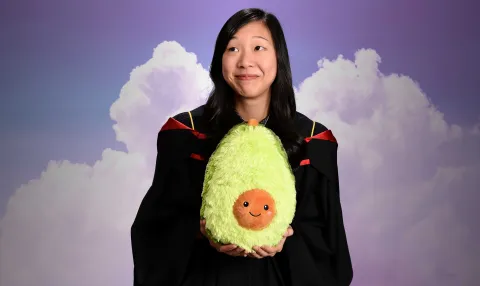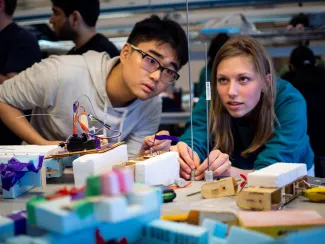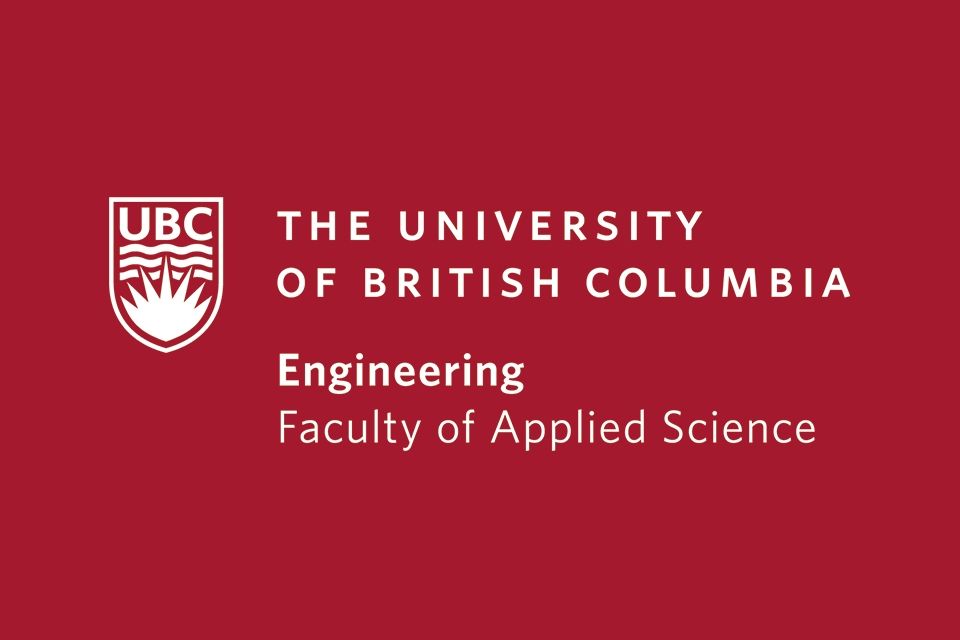"The law of conservation of energy generally applies to your time at UBC. The amount of time and effort you put into a project will produce equal returns in terms of practical knowledge."

Paige Ngo
- Degree:
- Bachelor of Applied Science
- Grad year: 2020
- Program:
- Campus: Vancouver
My parents came to Canada as refugees and worked extremely hard to provide for me (for which I am eternally grateful), and while their struggle inspired me to work hard to achieve my goals, it also made me more aware of other people's situations. This is why it's difficult for me to write about myself when others are being systemically oppressed due to racism. We live in a time where climate change, pandemics and riots are rightfully on everyone’s lips. Writing about myself feels self-indulgent at a time when I believe we, as a society, should be focusing on defunding the police and reducing greenhouse gas emissions.
In lieu of writing a bio, here is a quote by Maya Angelou:
“Life is pure adventure, and the sooner we realize that, the quicker we will be able to treat life as art.”
― Maya Angelou
Why did you choose to go into your field of study at UBC?
I choose engineering to fulfill an ever-growing desire to effect change in the world, as cliché as that sounds. I count myself lucky to have found a degree that would both fuel my passion for design and provide me the tools to make a difference. Unfortunately, this realization came six years after I needed to make my initial choice after graduating high school. I had completed a bachelor’s in biology and spent a couple of years teaching English in Japan before I discovered I could build my ideas with a degree in mechatronics. I credit my British friend, Cherie, and a chance late-night conversation we had for this discovery. My decision to dedicate another five years to study and amass more debt was difficult to make, but in the end, I don’t have a single quark of regret.
What has made your time at UBC memorable?
Many of my fondest memories are from my time at UBC; designing and racing air balloons in MECH2, coffee meet-ups in Seedlings, Dr. Schajer’s homemade trifle, Gomenaspike winning the EUS Voll-E Ball tournament, brewing beer and playing DnD with friends, volunteering at the UBC Bike Co-op and Dr. Zimmerman’s smiles and continued support despite the COVID-19 crisis, to name a few. The common themes among these memories are the communities I belonged to and the MECH department’s caring professors. The communities you join will shape your experience at university and I owe much more than I could possibly write here to my 209 study crew, my Club Mech exec team, SUBC (UBC’s Submarine Design Team, pronounced “sub-sea”), the Femur Fracture Treatment Project team and the Bike Co-op for building me up to who I am today.
What has been your most valuable non-academic experience studying at UBC?
My most valuable and rewarding non-academic experience would have to be captaining SUBC, a student design team. The balancing act that is juggling coursework and student team involvement pushed my time management skills to its limits. I feel much more confident as a leader and in my ability to manage a large project after fulfilling this role. It taught me that the best motivation is the kind your team members derive from themselves; I’ll always ask new members what they want from the experience and what I can do to help them achieve that. Taking on leadership roles is worthwhile, because it affords you the opportunity to meet some of the brightest and most ambitious students of every year group. The strongest relationships you’ll form are with the people who share your passion, and as an engineering student, you will not find people more passionate about their trade than in student teams — at least, that was my experience. Even if you don’t have a winning design, maybe you’ll learn to scuba dive, get to swim with your project or have a cross-country road trip that you’ll remember forever.
Tell us about your experience in your program. What have you learned that is most valuable?
My time at UBC was quite varied in the assortment of roles I filled: a co-op in APSC’s Professional Development department, a UBC Bike Co-op board of directors member, a submarine pilot for SUBC and president of the Mechanical Engineering Club. My key takeaways from my studies, internships and student team roles are that design is an iterative process and that your message is meaningless if you don’t tailor it to your audience. You learn that design is iterative as early as APSC 100, but its importance cannot be stressed enough. Perfection in design can never be achieved, but the more iterative cycles you complete, the closer you’ll get. Test and break your design early and intelligently so that you can learn from it and fix it before it’s too late. In design, if you don’t clearly define the problem you are trying to solve, your design is bound to miss its mark. The same goes for how you communicate. From sending out cover letters to improv theatre, understanding the people you are communicating to should not only dictate what you say, but how you say it.
What advice would you give a student entering your degree program?
You get as much out as you put in. The law of conservation of energy generally applies to your time at UBC. The amount of time and effort you put into a project will produce equal returns in terms of practical knowledge. This applies most to personal projects and student teams because you are in control of what you want to learn and you are not rewarded with (at times arbitrary) grades. Your professors will do their part in drilling you with theory, but working on personal and extracurricular projects will do the work of forcing an understanding of said theories in context and building your core engineering skills such as problem solving and design. One of the most important skills an engineer should have is ‘learning to learn.’ This is developed when you are forced to seek an answer out on your own accord.
How do you feel your degree has benefitted you compared to a different field of study?
Mechatronics engineering is special in just how broad and applicable it is, especially in today’s increasingly digital world. It gives you the skills you need to understand how things work on every level, from the mechanics — the muscles and skeleton that ground things in reality — to the electronics —the magic smoke capsules and angry pixies that make things tick — to the software — the brains of the operation. I have seen so many of my peers take different inspirations from the mechatronics program and choose different career paths. It’s exciting to think of the ways I’ll be able to apply my knowledge in the future.
Where do you find your inspiration?
I was lucky enough to have several mentors throughout my degree. During my time on SUBC (the UBC submarine design team), I had in-person advisory meetings with Dr. Chris McKesson. I have not met anyone so passionate and well versed in their area of expertise of naval and marine engineering — his excitement was truly contagious. As a co-op employee in the Professional Development department, Elise Goodreault was my manager. In the ways that she supported me and my growth in the role, she remains to this day my gold standard for managers. Nicolas Unick is the mentor that I was paired with during the APSC mentoring program in second year. Despite having graduated, I still reach out to him for technical and career-related matters. Finally, I am most thankful and inspired by my partner, Simon Honigmann. He is currently pursuing a master’s in robotics and has always inspired me to be the best engineer and person I can be.
What are your immediate and/or long-term plans for the future?
My immediate plans are to continue leveling up as an amateur artisanal sourdough baker, and to continue cooking dishes from a different country every week with my partner (this week was an Iranian pomegranate chicken dish called khoresh-e fesenjoon with kabocha as chicken substitute, served with tachin, a crispy saffron rice cake). I am also helping to design an interactive installation that presents real-time air pollution data as part of the team in the ATTA collective.
What are your future plans to make a difference in our world?
This is a challenging question, because there are so many pressing issues in the world right now and I’m predisposed to find the one where I will be able to make the largest impact. I have, however, always been a strong advocate of environmental sustainability. Climate change, being an ever-present crisis even in an era of crises, is a defining factor in my future career choices. I do not believe that technology alone will solve any of the current world's problems, but I do hope that my designs will make it easier for the everyday person to make sustainable choices. I plan to focus on end-of-life design so that products are reused more readily and whose materials have take-back programs. As agriculture plays a major role in sustainability, I am also looking at career opportunities in agro-tech in the hopes of producing more local and resource-light farming.




